外研版(2019)必修第三册 Unit 1 Knowing Me, Knowing You Writing&Presenting ideas 课件 (共20张PPT,含1视频)
文档属性
| 名称 | 外研版(2019)必修第三册 Unit 1 Knowing Me, Knowing You Writing&Presenting ideas 课件 (共20张PPT,含1视频) | 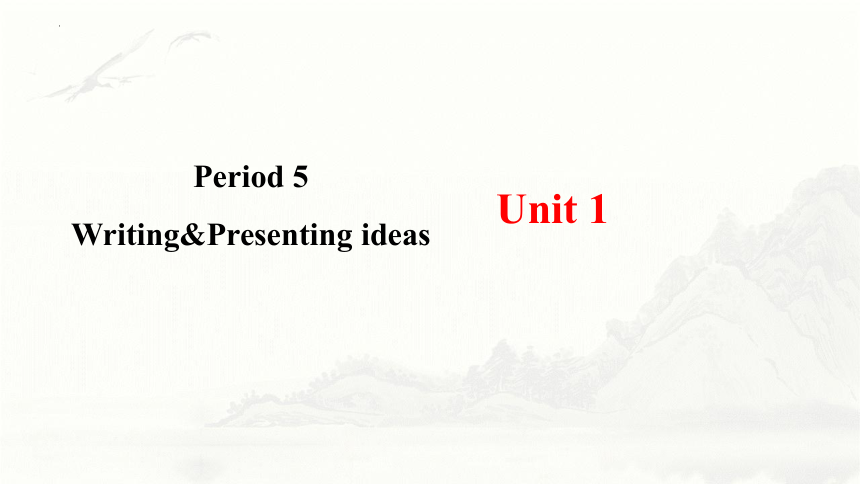 | |
| 格式 | pptx | ||
| 文件大小 | 36.5MB | ||
| 资源类型 | 教案 | ||
| 版本资源 | 外研版(2019) | ||
| 科目 | 英语 | ||
| 更新时间 | 2024-01-15 09:08:46 | ||
图片预览


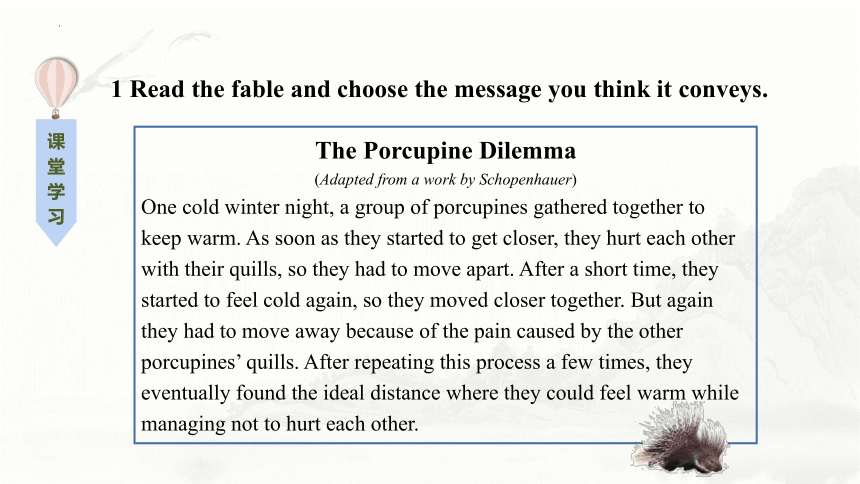
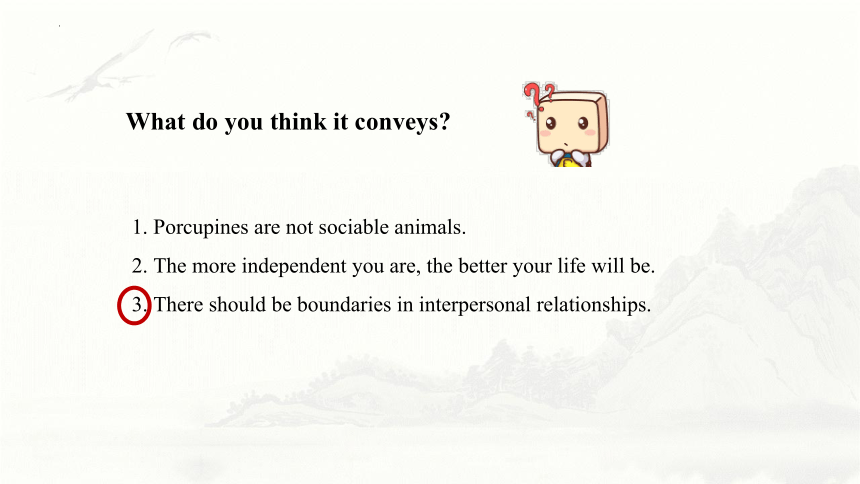
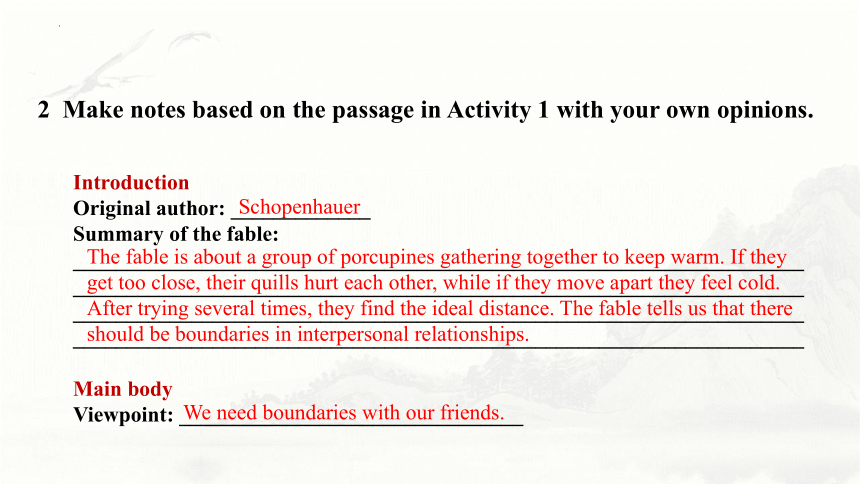
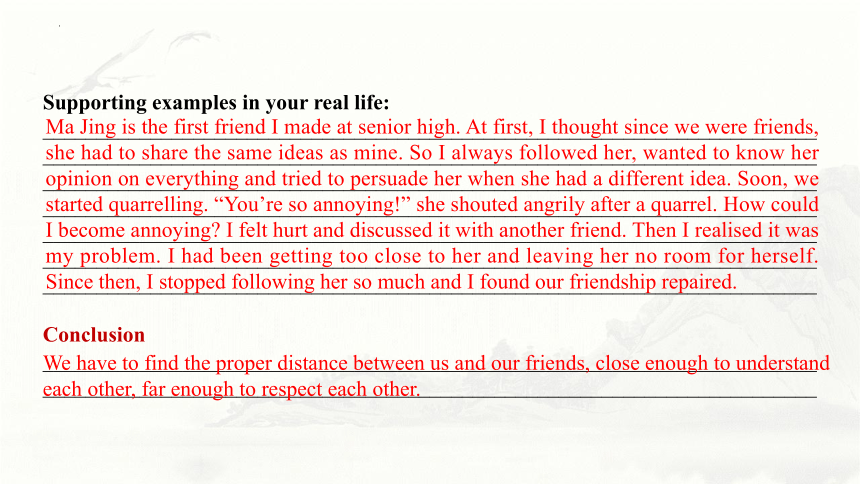
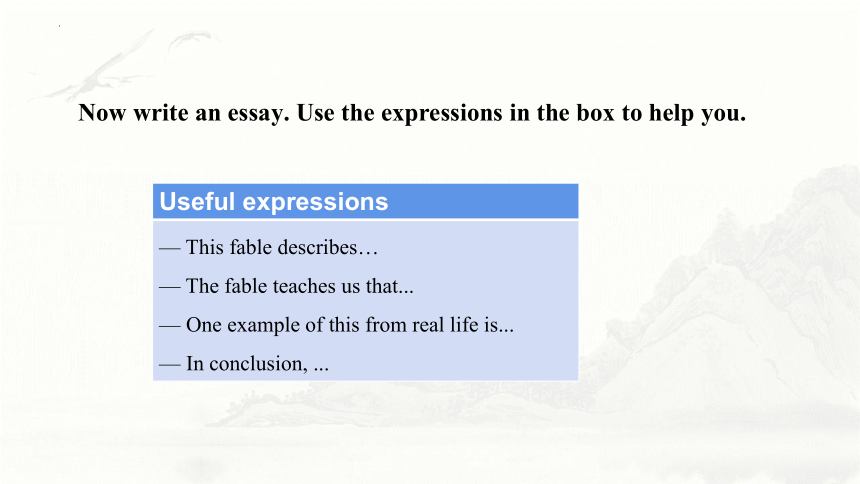
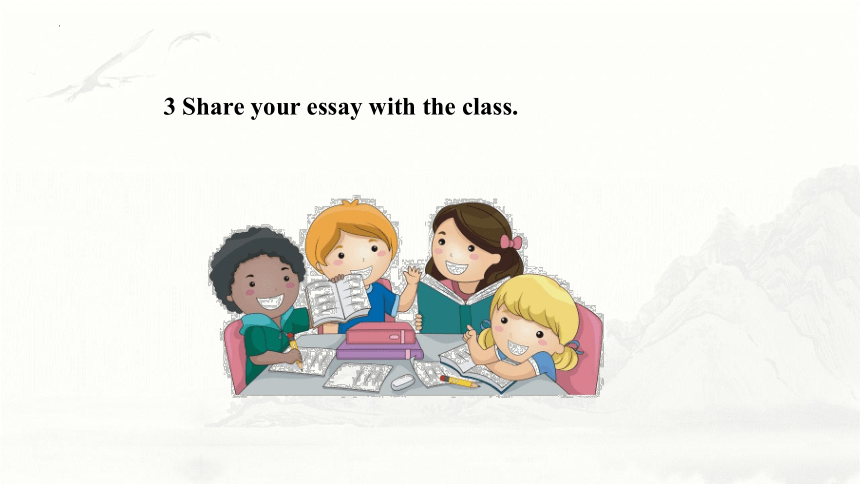
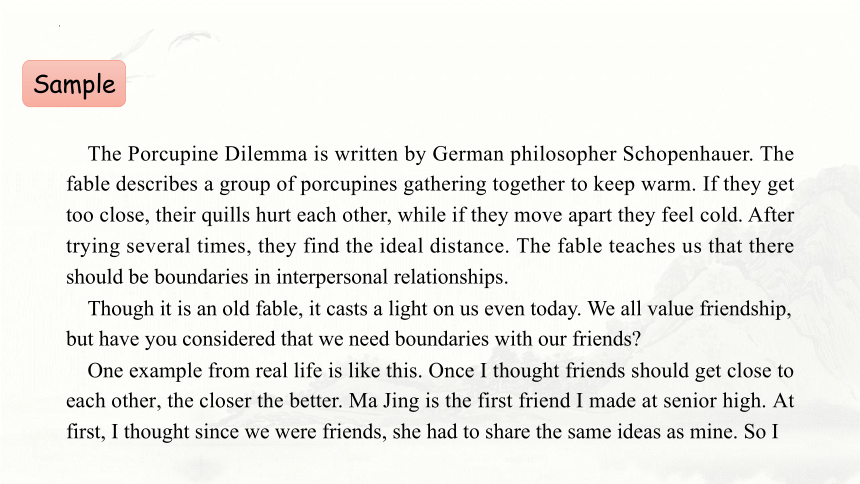
文档简介
(共20张PPT)
Unit 1
Period 5
Writing&Presenting ideas
新 课 导 入
视频:豪猪
课 堂 学 习
1 Read the fable and choose the message you think it conveys.
The Porcupine Dilemma
(Adapted from a work by Schopenhauer)
One cold winter night, a group of porcupines gathered together to keep warm. As soon as they started to get closer, they hurt each other with their quills, so they had to move apart. After a short time, they started to feel cold again, so they moved closer together. But again they had to move away because of the pain caused by the other porcupines’ quills. After repeating this process a few times, they eventually found the ideal distance where they could feel warm while managing not to hurt each other.
1. Porcupines are not sociable animals.
2. The more independent you are, the better your life will be.
3. There should be boundaries in interpersonal relationships.
What do you think it conveys
2 Make notes based on the passage in Activity 1 with your own opinions.
Introduction
Original author: _____________
Summary of the fable: ____________________________________________________________________ ____________________________________________________________________________________________________________________________________________________________________________________________________________
Main body
Viewpoint: ________________________________
Schopenhauer
The fable is about a group of porcupines gathering together to keep warm. If they get too close, their quills hurt each other, while if they move apart they feel cold. After trying several times, they find the ideal distance. The fable tells us that there should be boundaries in interpersonal relationships.
We need boundaries with our friends.
Supporting examples in your real life: ________________________________________________________________________________________________________________________________________________
________________________________________________________________________
________________________________________________________________________
________________________________________________________________________
________________________________________________________________________
________________________________________________________________________
Conclusion
________________________________________________________________________
________________________________________________________________________
Ma Jing is the first friend I made at senior high. At first, I thought since we were friends, she had to share the same ideas as mine. So I always followed her, wanted to know her opinion on everything and tried to persuade her when she had a different idea. Soon, we started quarrelling. “You’re so annoying!” she shouted angrily after a quarrel. How could I become annoying I felt hurt and discussed it with another friend. Then I realised it was my problem. I had been getting too close to her and leaving her no room for herself. Since then, I stopped following her so much and I found our friendship repaired.
We have to find the proper distance between us and our friends, close enough to understand each other, far enough to respect each other.
Now write an essay. Use the expressions in the box to help you.
Useful expressions
— This fable describes…
— The fable teaches us that...
— One example of this from real life is...
— In conclusion, ...
3 Share your essay with the class.
Sample
The Porcupine Dilemma is written by German philosopher Schopenhauer. The fable describes a group of porcupines gathering together to keep warm. If they get too close, their quills hurt each other, while if they move apart they feel cold. After trying several times, they find the ideal distance. The fable teaches us that there should be boundaries in interpersonal relationships.
Though it is an old fable, it casts a light on us even today. We all value friendship, but have you considered that we need boundaries with our friends
One example from real life is like this. Once I thought friends should get close to each other, the closer the better. Ma Jing is the first friend I made at senior high. At first, I thought since we were friends, she had to share the same ideas as mine. So I
always followed her, wanted to know her opinion on everything and tried to persuade her when she had a different idea. Soon, we started quarrelling. “You’re so annoying!” she shouted angrily after a quarrel. How could I become annoying I felt hurt and discussed it with another friend. Then I realised it was my problem. I had been getting too close to her and leaving her no room for herself. Since then, I stopped following her so much and I found our friendship repaired. Now I have realised that friends need to have boundaries and respect each other, no matter how close we are.
In conclusion, in order to make our friendship last long, we have to find the proper distance between us and our friends, close enough to understand each other, far enough to respect each other.
Presenting ideas
1 Work in groups. Read the quotations and discuss their meanings.
1. Do not do to others what you do not want others to do to you.
Confucius
2. Good fences make good neighbours.
Proverb
3. The most basic of all human needs is the need to understand and be understood.
Ralph G. Nichols
Analysis of the quotation 1
Do not do to others what you do not want others to do to you.
Confucius
Eg: Teachers often tell us, “do not do to others what you do not want others to do to you. In other words, we should treat others the way we would like to be treated.
译文:己所不欲,勿施于人。——孔子
Is it not delightful to have friends coming from distant quarters 【quarter n. a district or part of a town 】
有朋自远方来,不亦乐乎?
It passes on just like this, not ceasing day or night!【cease vi. 停止】
逝者如斯夫,不舍昼夜。
If a man take no thought about what is distant, he will find sorrow near at hand.
【sorrow n. 悲伤 】
人无远虑,必有近忧。
Keep what you say and carry out what you do.【carry out 执行,完成 】
言必信,行必果。
From Confucius
Analysis of the quotation 2
Good fences make good neighbours.
Proverb
Proverb: a well known sentence or phrase that gives advice and says sth. that generally true.
译文: 好篱笆造就好邻居。
Similar expressions:
eg: A hedge between keeps friendship green. 君子之交淡如水。
Correct counting keeps good friendship. 亲兄弟明算账 。
Analysis of the quotation 3
The most basic of all human needs is the need to understand and be understood.
Ralph G. Nichols is an American scholar on listening behavior. His book Are you listening shows how we listen and listening and communication efficiency can be improved.
structure: S+V+P(主系表结构) 不定式to understand and be understood作后置定语修饰the need
译文:人类最基本的需要就是理解和被理解。
more quotations for you:
1. Well begun is half done. 好的开始是成功的一半。
2. Rome is not built in a day. 冰冻三尺非一日之寒。
3. Look before you leap. 三思而后行。
4. Practice makes perfect. 熟能生巧。
5. A friend in need is a friend indeed. 患难见真情。
6. An idle youth, a needy age. 少壮不努力,老大徒伤悲。
7. A journey of one thousand miles begins with one step. 千里之行,始于足下。
2 Choose one quotation and discuss the following points.
its main message
how it applies to everyday life, giving examples
what we can learn from the quotation
3 Present your ideas to the class. Use the expressions in the box to help you.
Useful expressions
We have chosen to talk about the quotation...
The main message of this quotation is...
In daily life, ...
Another example is...
In conclusion, this quotation teaches us that...
We have chosen to talk about the quotation “Good fences make good neighbours”.
The main message of this quotation is as follows: It is wise to have a clear responsibility / boundary between neigbours.
In daily life, for example, it is better for us to keep a certain distance between us and our friends.
Another similar saying is “Correct counting keeps good friendship (亲兄弟明算账) ”.
In conclusion, this quotation teaches us that we should have a clear division of work and mind your own business and do not interfere others’ affairs.
Sample
Try to express your own opinions on the three quotations bellow.
1. Do not do to others what you do not want others to do to you.
Confucius
2. Good fences make good neighbours.
Proverb
3. The most basic of all human needs is the need to understand and be understood.
Ralph G. Nichols
Unit 1
Period 5
Writing&Presenting ideas
新 课 导 入
视频:豪猪
课 堂 学 习
1 Read the fable and choose the message you think it conveys.
The Porcupine Dilemma
(Adapted from a work by Schopenhauer)
One cold winter night, a group of porcupines gathered together to keep warm. As soon as they started to get closer, they hurt each other with their quills, so they had to move apart. After a short time, they started to feel cold again, so they moved closer together. But again they had to move away because of the pain caused by the other porcupines’ quills. After repeating this process a few times, they eventually found the ideal distance where they could feel warm while managing not to hurt each other.
1. Porcupines are not sociable animals.
2. The more independent you are, the better your life will be.
3. There should be boundaries in interpersonal relationships.
What do you think it conveys
2 Make notes based on the passage in Activity 1 with your own opinions.
Introduction
Original author: _____________
Summary of the fable: ____________________________________________________________________ ____________________________________________________________________________________________________________________________________________________________________________________________________________
Main body
Viewpoint: ________________________________
Schopenhauer
The fable is about a group of porcupines gathering together to keep warm. If they get too close, their quills hurt each other, while if they move apart they feel cold. After trying several times, they find the ideal distance. The fable tells us that there should be boundaries in interpersonal relationships.
We need boundaries with our friends.
Supporting examples in your real life: ________________________________________________________________________________________________________________________________________________
________________________________________________________________________
________________________________________________________________________
________________________________________________________________________
________________________________________________________________________
________________________________________________________________________
Conclusion
________________________________________________________________________
________________________________________________________________________
Ma Jing is the first friend I made at senior high. At first, I thought since we were friends, she had to share the same ideas as mine. So I always followed her, wanted to know her opinion on everything and tried to persuade her when she had a different idea. Soon, we started quarrelling. “You’re so annoying!” she shouted angrily after a quarrel. How could I become annoying I felt hurt and discussed it with another friend. Then I realised it was my problem. I had been getting too close to her and leaving her no room for herself. Since then, I stopped following her so much and I found our friendship repaired.
We have to find the proper distance between us and our friends, close enough to understand each other, far enough to respect each other.
Now write an essay. Use the expressions in the box to help you.
Useful expressions
— This fable describes…
— The fable teaches us that...
— One example of this from real life is...
— In conclusion, ...
3 Share your essay with the class.
Sample
The Porcupine Dilemma is written by German philosopher Schopenhauer. The fable describes a group of porcupines gathering together to keep warm. If they get too close, their quills hurt each other, while if they move apart they feel cold. After trying several times, they find the ideal distance. The fable teaches us that there should be boundaries in interpersonal relationships.
Though it is an old fable, it casts a light on us even today. We all value friendship, but have you considered that we need boundaries with our friends
One example from real life is like this. Once I thought friends should get close to each other, the closer the better. Ma Jing is the first friend I made at senior high. At first, I thought since we were friends, she had to share the same ideas as mine. So I
always followed her, wanted to know her opinion on everything and tried to persuade her when she had a different idea. Soon, we started quarrelling. “You’re so annoying!” she shouted angrily after a quarrel. How could I become annoying I felt hurt and discussed it with another friend. Then I realised it was my problem. I had been getting too close to her and leaving her no room for herself. Since then, I stopped following her so much and I found our friendship repaired. Now I have realised that friends need to have boundaries and respect each other, no matter how close we are.
In conclusion, in order to make our friendship last long, we have to find the proper distance between us and our friends, close enough to understand each other, far enough to respect each other.
Presenting ideas
1 Work in groups. Read the quotations and discuss their meanings.
1. Do not do to others what you do not want others to do to you.
Confucius
2. Good fences make good neighbours.
Proverb
3. The most basic of all human needs is the need to understand and be understood.
Ralph G. Nichols
Analysis of the quotation 1
Do not do to others what you do not want others to do to you.
Confucius
Eg: Teachers often tell us, “do not do to others what you do not want others to do to you. In other words, we should treat others the way we would like to be treated.
译文:己所不欲,勿施于人。——孔子
Is it not delightful to have friends coming from distant quarters 【quarter n. a district or part of a town 】
有朋自远方来,不亦乐乎?
It passes on just like this, not ceasing day or night!【cease vi. 停止】
逝者如斯夫,不舍昼夜。
If a man take no thought about what is distant, he will find sorrow near at hand.
【sorrow n. 悲伤 】
人无远虑,必有近忧。
Keep what you say and carry out what you do.【carry out 执行,完成 】
言必信,行必果。
From Confucius
Analysis of the quotation 2
Good fences make good neighbours.
Proverb
Proverb: a well known sentence or phrase that gives advice and says sth. that generally true.
译文: 好篱笆造就好邻居。
Similar expressions:
eg: A hedge between keeps friendship green. 君子之交淡如水。
Correct counting keeps good friendship. 亲兄弟明算账 。
Analysis of the quotation 3
The most basic of all human needs is the need to understand and be understood.
Ralph G. Nichols is an American scholar on listening behavior. His book Are you listening shows how we listen and listening and communication efficiency can be improved.
structure: S+V+P(主系表结构) 不定式to understand and be understood作后置定语修饰the need
译文:人类最基本的需要就是理解和被理解。
more quotations for you:
1. Well begun is half done. 好的开始是成功的一半。
2. Rome is not built in a day. 冰冻三尺非一日之寒。
3. Look before you leap. 三思而后行。
4. Practice makes perfect. 熟能生巧。
5. A friend in need is a friend indeed. 患难见真情。
6. An idle youth, a needy age. 少壮不努力,老大徒伤悲。
7. A journey of one thousand miles begins with one step. 千里之行,始于足下。
2 Choose one quotation and discuss the following points.
its main message
how it applies to everyday life, giving examples
what we can learn from the quotation
3 Present your ideas to the class. Use the expressions in the box to help you.
Useful expressions
We have chosen to talk about the quotation...
The main message of this quotation is...
In daily life, ...
Another example is...
In conclusion, this quotation teaches us that...
We have chosen to talk about the quotation “Good fences make good neighbours”.
The main message of this quotation is as follows: It is wise to have a clear responsibility / boundary between neigbours.
In daily life, for example, it is better for us to keep a certain distance between us and our friends.
Another similar saying is “Correct counting keeps good friendship (亲兄弟明算账) ”.
In conclusion, this quotation teaches us that we should have a clear division of work and mind your own business and do not interfere others’ affairs.
Sample
Try to express your own opinions on the three quotations bellow.
1. Do not do to others what you do not want others to do to you.
Confucius
2. Good fences make good neighbours.
Proverb
3. The most basic of all human needs is the need to understand and be understood.
Ralph G. Nichols
